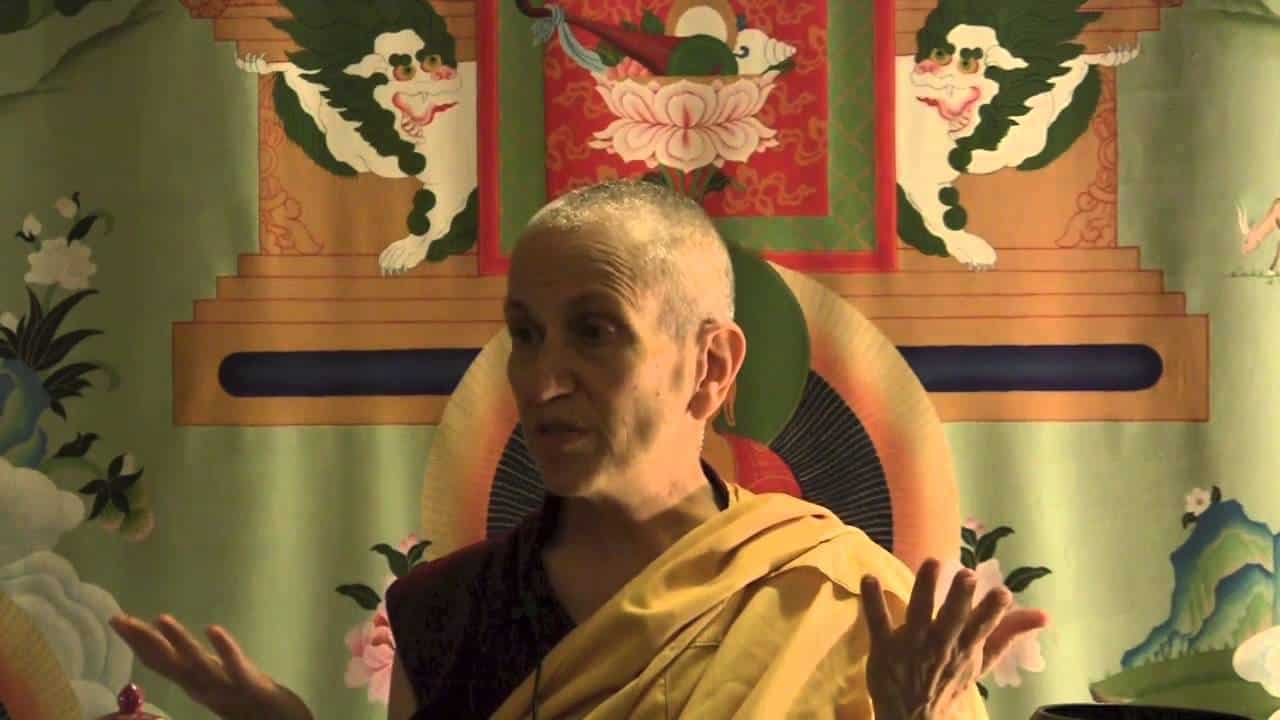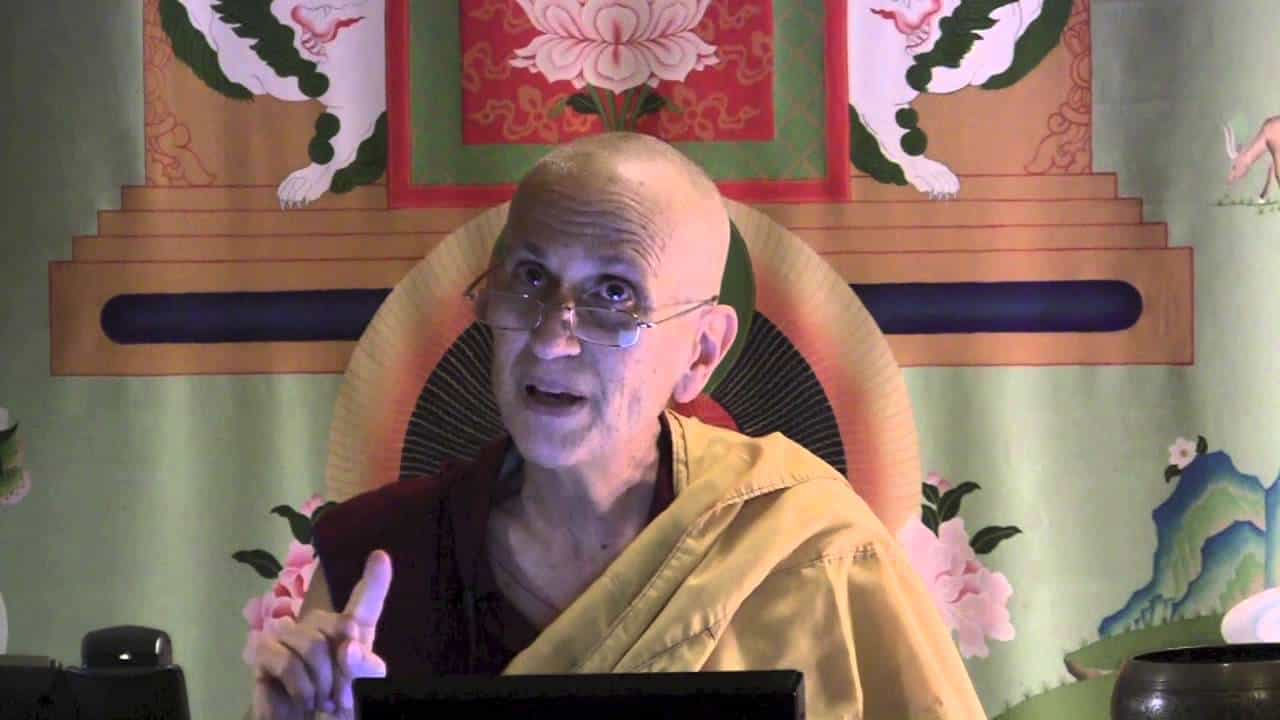Dependent designation
Part of a series of short talks given on Nagarjuna's Precious Garland of Advice for a King during the Manjushri Winter Retreat.
- The two places a truly existent person would have to be found
- How the person exists
- How the components making up the basis of designation of the person exist
- The selflessness of persons and the selflessness of phenomena
- The emptiness (selflessness) of words
Last time we had done Verse 80 from Precious Garland that read:
A person is not earth, not water, not fire, not wind,
not space, not consciousness, not all of them.
What person could there be other than these?
There we find that if the person were truly existent then the person would have to be either findable in the aggregates (as one of the aggregates) or as something completely different from the aggregates (the body and mind.) And we couldn’t find the person anywhere in those because the person has parts. Okay? So the person is something that is labeled in dependence upon the collection of different things—in this case, the six constituents. Sometimes we say the five aggregates. It doesn’t matter, the idea is the same, that there’s a basis of designation that has many parts, many components, and then there’s a person that is merely designated in dependence upon them through the power of conception—by being mentally fabricated.
Saying “conceptualized” seems okay. When you say “mentally fabricated,” it’s like, “What do you mean? I’m not mentally fabricated?” Well, isn’t that what conceptualization is? It’s taking things and putting them together and developing an idea and a thought about them that is all happening in our own mind, that we’re making in our own mind. We think that because other people have the same fabrications that therefore everything must exist as it appears to us. But, as we all learned [in] The Emperor’s New Clothes, just because everybody agrees with us does not mean something is correct. Okay? (It’s a very good story, actually, you know? It has a good point.)
The point in this verse is the person is not inherently existent and it depends on parts. That was emphasizing the selflessness of persons, looking for the “I.”
Then Verse 81 is the selflessness of phenomena. It says:
The person is not real (meaning truly existent)
because it is composed of the six constituents.
Likewise, since each constituent is also composed of parts
they are not real.
So not only is the person not truly existent, and existing only by conceptual fabrication, but also all the different components of the basis of designation of the person exist in the same way. Because if we look at any of the components they, too, can be subdivided into different aspects, different parts, different characteristics. So that’s the self of phenomena. When we’re looking for— According to the Prasangika, the self of persons is thinking the person is truly existent. And the self of phenomena is thinking that other phenomena (such as the components of the basis of designation of the person) that they truly exist. So we might negate true existence on the person but then when we’re doing it, all the components—the five elements plus consciousness, those six constituents, or the five aggregates—they just seem very solid: “There’s the earth element, there’s the body. There’s the consciousness.” As if these things were solid and had their own inherent nature and identity themselves. But, in the same way that the person is merely conceptualized on the basis of the aggregates, or the components, then each of those components are merely conceptually fabricated on the basis of their components, whatever they consist of.
When you see this you realize that you can never get to the smallest particle at all. It’s just impossible because mentally everything can keep being divided. We can never get to the smallest moment of time. And that everything that everything that exists depends on something else that is not it. It’s this whole thing, if you have a group of oranges and you put them together and you get an apple. You have a group of things that are not the person, or a group of things that are not the consciousness, you put them together and you designate consciousness, or the mind, or you put these together and you designate person. So it’s the same in both cases. Selflessness of persons, selflessness of phenomena.
Then Verse 99 says:
Since it is merely the absence of form,
space is merely a designation.
How can there be form without the elements?
Therefore the mere designation does not exist.
This one’s a little bit less obvious. “Since it is merely the absence of form, space is merely a designation.” So space, which is defined as the absence of obstructability (or tangibility). So space is posited in dependence upon form that has obstruction and tangibility. Okay? If there were no form—if form were totally non-existent—you could not posit space. So form exists by being merely labeled. Space exists in dependence upon form. And it’s merely designated on the absence of form, the absence of obstructability or tangibility. So space is a non-affirming negative. Remember these guys? Non-affirming negatives? So nothing positive is posited (or established), we’re just negating the obstructability, the obstruction, that form brings when we create the phenomena of space by giving that absence of obstructability the name space. Okay? So space is also not inherently existent. Even these non-affirming negatives also don’t truly exist.
Then the third line says, “How can there be form without the elements?” So now we’re going back to form again and saying form can’t exist without the elements upon which it depends as its basis of designation. So those elements of earth, water, fire, air. Okay? So form depends on its components which are the elements. So form also is merely designated. Okay? So how can there be form without the elements? So here we have everything’s existing by mere designation. Nothing is existing from its own side.
And then he says, “Therefore the mere designation does not exist.” And His Holiness explained this as meaning therefore that even the designation itself does not exist truly. So even the designation, the word, or even the process of designating. But especially the word that we’re putting on something, that also doesn’t exist by its own side.
We put so much stock in words And yet when you look all they are are sounds that we’ve attached meaning to. So they don’t exist from their own side with some kind of inherent meaning. This is very good to remember when people say things we don’t like. Because we usually say, “Their words have inherent meaning.” [Growl] “How dare they say that about me!” But to remember “therefore the mere designation does not (inherently) exist. He says, “Does not exist.” You have to put an “inherently” in there. Okay? And to remember that, that these things don’t inherently exist. We are giving meaning to those words, to those sounds.
So what we’re getting at is both the basis of designation doesn’t exist from its own side, and the designated object does not exist from its own side, and the designation (which could actually mean the designated object, too) it doesn’t exist from its own side. So all of our attempt to find something to hang our hat on, to say, “This is the ultimate something that we can hang onto,” that attempt is not working out. Okay? So might as well give it up.
And then next time we’ll do the two verses from the Karikas, from Nagarjuna’s Root Wisdom, or Treatise on the Middle Way.
Venerable Thubten Chodron
Venerable Chodron emphasizes the practical application of Buddha’s teachings in our daily lives and is especially skilled at explaining them in ways easily understood and practiced by Westerners. She is well known for her warm, humorous, and lucid teachings. She was ordained as a Buddhist nun in 1977 by Kyabje Ling Rinpoche in Dharamsala, India, and in 1986 she received bhikshuni (full) ordination in Taiwan. Read her full bio.


